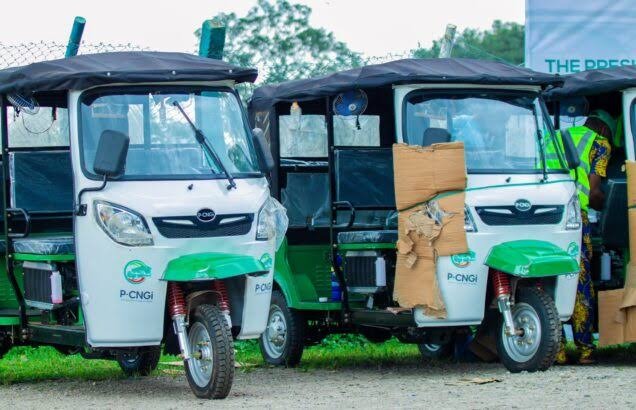The National Commercial Tricycle and Motorcycle Owners and Riders Association (NATOMORAS) has leveled serious accusations against the Presidential Compressed Natural Gas (CNG) Initiative, alleging a breach of a presidential campaign promise involving the allocation of 2,000 CNG tricycles. NATOMORAS claims that these tricycles, promised to its members as part of the presidential campaign, have been diverted and are now being sold at inflated prices through private companies, potentially enriching individuals at the expense of the intended beneficiaries. This dispute centers on the interpretation of a campaign pledge and the subsequent actions of the CNG Initiative, leading to a public clash between NATOMORAS and the initiative’s leadership.
At the heart of the controversy is the conflicting narrative surrounding the alleged promise. Usman Gwoza, the National President of NATOMORAS, insists that the presidential campaign explicitly committed to providing 2,000 CNG tricycles to their union. He claims to possess documentation, including letters of invitation to various events signed by the program director, and cites a specific event on October 1st where the promise was publicly reiterated. Gwoza asserts that both he and the program director delivered speeches at this event, during which the allocation of 2,000 CNG tricycles to NATOMORAS was explicitly mentioned. He further alleges that all official communication regarding the campaign promise was conducted through the program director, strengthening his claim of a direct agreement.
However, Michael Oluwagbemi, the program director and Chief Executive of the Presidential CNG Initiative, vehemently denies these allegations. He challenges Gwoza to produce concrete evidence of any such presidential commitment, suggesting that the promise, if made at all, was a private agreement without official backing. Oluwagbemi questions the validity of a verbal promise without supporting documentation, emphasizing the need for written agreements or video recordings to substantiate such claims. He categorically states that the president did not discuss any such allocation during the campaign, dismissing the possibility of an official commitment.
The disagreement escalates beyond the existence of the promise to encompass allegations of mismanagement and potential corruption. Gwoza accuses Oluwagbemi of diverting the CNG tricycles, alleging collusion with private companies to sell them at inflated prices. He claims that the initiative is selling the tricycles to these companies for N2.5 million, who then resell them to NATOMORAS members for N3.5 million, significantly higher than any intended subsidized price. This alleged profiteering, Gwoza argues, deprives NATOMORAS members of the intended benefits and raises concerns about the transparency and ethical conduct of the CNG Initiative. Gwoza further alleges that other unions, such as NARTO and RTEAN, have received CNG buses, suggesting preferential treatment and further fueling his suspicions about the initiative’s motives.
To bolster his claims, Gwoza highlights NATOMORAS’ active participation in the presidential campaign, emphasizing their formal role and the recognition they received from the campaign council. He points to their involvement in the campaign declaration, where the Vice President and the Minister of Agric represented the President. Gwoza emphasizes their official designation as the Director of Community Transport within the Presidential Campaign Council, asserting that this formal role substantiates their expectation of the promised tricycles. He claims to possess letters signed by both the PCC and the Secretary PCC, as well as documentation of the party’s recognition of NATOMORAS and their intended collaboration.
Gwoza concludes by calling for a government investigation into the matter, urging the president to intervene and address the alleged diversion of the CNG tricycles and the inflated prices being charged. He stresses the importance of transparency and accountability in the distribution of these resources, highlighting the potential financial burden placed on NATOMORAS members who are now forced to purchase the tricycles at exorbitant prices. Gwoza’s appeal for a government investigation underscores the seriousness of the allegations and the potential ramifications of this dispute for both the affected union members and the credibility of the CNG Initiative. His emphasis on bringing the matter to the president’s attention suggests a belief that the president may be unaware of these alleged dealings and that intervention from the highest office is necessary to rectify the situation.


